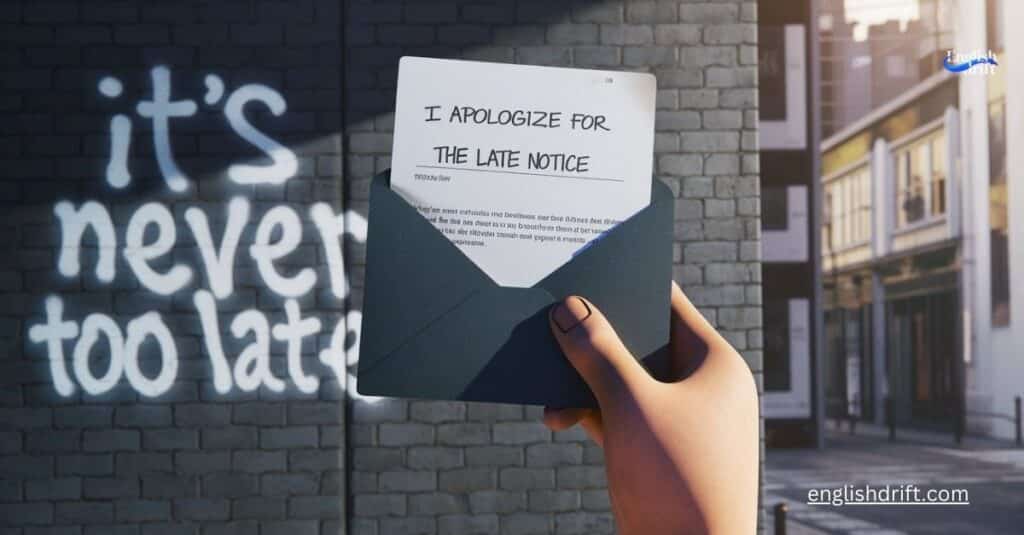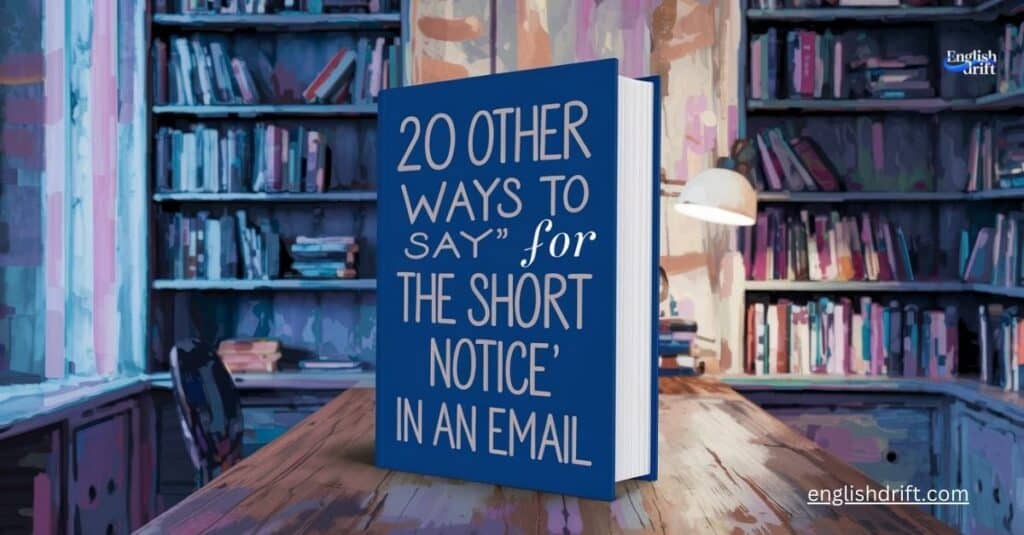In professional communication, especially over email, there are times when you need to deliver information with short notice. Maybe it’s about a meeting that needs rescheduling, or a deadline that just moved up. Regardless of the situation, how you apologize for the disruption or inconvenience is crucial. Saying “Sorry for the short notice” might sound like an easy solution, but using the same phrase repeatedly can make your emails feel unprofessional or lazy.
In this comprehensive guide, we will cover 23 alternatives to “Sorry for the short notice” with examples and tips on how to use them. These alternatives will help you sound more polished and maintain professionalism, even when you’re delivering urgent messages.
What Does “Sorry for the Short Notice” Actually Mean?
When you say “Sorry for the short notice” you’re acknowledging that you’re giving someone very little time to respond or act. This phrase is often used when you need to send information urgently and you’re aware that the recipient may have needed more lead time. It’s a polite way to express regret and maintain the relationship with the recipient.
Why It’s Important to Apologize Professionally for Last-Minute Changes
When working in a professional setting, respecting the recipient’s time is key. Whether you’re sending a last-minute email about a meeting or an urgent notice for a deadline, not acknowledging the inconvenience can hurt your reputation. Apologizing for short notice or hasty notice helps maintain trust and shows respect.
Here are some situations where you might need to apologize for short notice:
- Last-minute meeting rescheduling
- Project deadline changes
- Emergency decisions that require immediate attention
- Event cancellations or shifts
The tone and language you use in your short notice emails will leave a lasting impression. So, let’s dive into 23 better ways to say “Sorry for the short notice” that are appropriate for different professional settings.
1. “I Apologize for the Late Notice”
Definition: This phrase is a more direct, formal apology, acknowledging that the information is being shared later than it should have been.
When to use it: Use this when the recipient might have expected an earlier update or notification, but circumstances prevented you from delivering it on time.
Examples:
- “I apologize for the late notice, but we need to reschedule the meeting for tomorrow.”
- “I apologize for the late notice regarding the deadline extension.”
Why it works: This phrase works well in both formal and informal contexts. It balances respect for the recipient’s time with a clear acknowledgment that you’re at fault for the delay.

2. “Thank You for Your Understanding with This Short Notice”
Definition: This phrase shifts the focus toward gratitude, acknowledging the recipient’s patience and flexibility, even if they are inconvenienced by the short timeframe.
When to use it: Best for situations where you expect the recipient to accommodate a sudden change or request, and you want to emphasize their cooperation.
Examples:
- “Thank you for your understanding with this short-notice meeting request.”
- “Thank you for your understanding about the sudden schedule change.”
Why it works: By expressing gratitude instead of just apologizing, this phrase adds a positive tone to the message, making the request sound less demanding.
3. “I Regret the Urgent Nature of This Request”
Definition: This phrase emphasizes the urgency of the situation while politely conveying regret about it.
When to use it: Use this when time is a critical factor, and you need a prompt response or action from the recipient.
Examples:
- “I regret the urgent nature of this request, but we need your input by tomorrow.”
- “I regret the urgency, but this decision must be made by the end of the day.”
Why it works: It conveys urgency without being pushy, making it clear that the situation is beyond your control, but you’re mindful of the recipient’s time.
4. “Please Excuse the Limited Time for Preparation”
Definition: This phrase directly addresses the fact that the recipient may not have enough time to prepare, without sounding overly apologetic.
When to use it: Use this when sending invites or tasks that require preparation but the timeframe is tight.
Examples:
- “Please excuse the limited time for preparation, but the meeting will be tomorrow.”
- “Please excuse the limited preparation time, but we need to present this by Friday.”
Why it works: This phrase is straightforward and acknowledges the inconvenience in a professional way, without making excuses.
5. “My Apologies for the Lack of Advanced Notice”
Definition: This phrase emphasizes that you should have communicated sooner but were unable to do so.
When to use it: Use when informing someone of a meeting, deadline, or event that they likely expected more notice for.
Examples:
- “My apologies for the lack of advanced notice about the event cancellation.”
- “My apologies for not giving you earlier notice regarding the meeting.”
Why it works: This is a formal and professional phrase that directly addresses the issue of timing while showing accountability.

6. “I Regret Any Inconvenience This May Cause”
Definition: A polite way to express that you’re aware your email or request may cause disruption or difficulties.
When to use it: Perfect for instances when the short notice could affect the recipient’s schedule or work.
Examples:
- “I regret any inconvenience this may cause, but the project deadline has moved up.”
- “I regret any inconvenience caused by this last-minute email, but we need a decision soon.”
Why it works: This phrase is a balanced apology that demonstrates awareness of the inconvenience without dwelling on the problem.
7. “Sorry for the Sudden Change in Plans”
Definition: A more casual and direct apology for changing plans at the last minute.
When to use it: Best for situations where plans need to be altered unexpectedly, but the relationship with the recipient allows for a slightly more informal tone.
Examples:
- “Sorry for the sudden change in plans, but we need to move the meeting to 2 PM.”
- “Sorry for the sudden change, but the project deadline has been moved up.”
Why it works: This phrase is casual but still conveys an apology, making it suitable for less formal situations.
8. “Please Forgive the Urgency of This Message”
Definition: A more formal way of acknowledging the recipient’s need to respond quickly.
When to use it: Ideal for emails that require immediate attention or action, especially in business settings.
Examples:
- “Please forgive the urgency of this message, but we need your feedback by noon.”
- “Please forgive the urgency, but we require a quick response on this matter.”
Why it works: This phrase keeps the tone professional while making it clear that the request is urgent.
9. “I Apologize for the Short Lead Time”
Definition: A formal acknowledgment of providing insufficient time between the notification and the deadline.
When to use it: Use for work-related tasks that need to be completed in a short time frame.
Examples:
- “I apologize for the short lead time, but the report must be submitted by tomorrow.”
- “I apologize for the short lead time, but we need your input by the end of the week.”
Why it works: This phrase is clear and to the point, conveying urgency without sounding harsh.

10. “Thank You for Accommodating This Last-Minute Request”
Definition: This phrase expresses gratitude while acknowledging the inconvenience of a late request.
When to use it: Perfect for situations where you’re asking for something last-minute, and the recipient is likely to accommodate you.
Examples:
- “Thank you for accommodating this last-minute meeting request.”
- “Thank you for adjusting your schedule to accommodate the short-notice task.”
Why it works: By focusing on gratitude, this phrase softens the blow of the short notice and makes the recipient feel appreciated.
11. “I Realize This is Short Notice”
Definition: A neutral and polite acknowledgment that the information is coming later than ideal.
When to use it: Use when you need to inform someone with limited time but still want to keep the tone professional.
Examples:
- “I realize this is short notice, but we need to finalize the contract by tomorrow.”
- “I realize this is short notice, but we’d appreciate your input by the end of the day.”
Why it works: This phrase is a professional way to apologize without being overly formal, making it versatile for many situations.
12. “Apologies for the Time-Sensitive Nature of This Request”
Definition: A polite acknowledgment that the request needs to be handled promptly.
When to use it: Use when sending urgent requests that require immediate attention.
Examples:
- “Apologies for the time-sensitive nature of this request, but we need your approval today.”
- “Apologies for the urgency, but we must complete this task by the end of the day.”
Why it works: This phrase conveys the urgency of the situation while remaining respectful and polite.
13. “Please Accept My Apologies for the Rush”
Definition: Apologizing for the fast pace or short timeline involved in the task.
When to use it: Use this when you know the task or request is rushed, but there’s no other option.
Examples:
- “Please accept my apologies for the rush, but we need to submit the report today.”
- “Please accept my apologies for the rush, but the decision must be made by tomorrow.”
Why it works: This is a direct and professional phrase that clearly acknowledges the rushed nature of the request without sounding desperate.
14.“I Apologize for the Short Notice and Any Disruption”
Definition: This phrase combines an apology for the short notice with an acknowledgment of the potential inconvenience caused.
When to use it: Ideal for situations where you’re aware that your request may disrupt the recipient’s schedule.
Examples:
- “I apologize for the short notice and any disruption to your plans.”
- “I apologize for the short notice and understand if this causes inconvenience.”
Why it works: This phrase is a thorough way to apologize, acknowledging both the short notice and the potential disruption it may cause.
15. “I Understand This is Last-Minute”
Definition: A casual acknowledgment that you’re making a request or sharing information at the last minute.
When to use it: Use this when you’re aware that the request is sudden but still need to maintain a professional tone.
Examples:
- “I understand this is last-minute, but we need to confirm your availability for the meeting.”
- “I understand this is last-minute, but could you please review this document by the end of the day?”
Why it works: This phrase is straightforward and professional, making it suitable for both formal and informal situations.

16. “My Apologies for the Tight Timeframe”
Definition: A direct apology for providing a short window of time to complete a task.
When to use it: Use for tasks or deadlines that are urgent and don’t allow for much preparation.
Examples:
- “My apologies for the tight timeframe, but we need to finish this by the end of the week.”
- “My apologies for the tight timeframe, but the document must be submitted by tomorrow.”
Why it works: This phrase is a polite way to express regret about the limited time, without sounding overly apologetic.
17. “Thank You for Your Flexibility”
Definition: This phrase focuses on gratitude, thanking the recipient for adjusting to last-minute changes.
When to use it: Use this when the recipient has already adjusted their schedule or plans to accommodate the short notice.
Examples:
- “Thank you for your flexibility with this last-minute meeting.”
- “Thank you for your flexibility in adjusting the timeline.”
Why it works: By expressing gratitude, this phrase softens the impact of the short notice and shows appreciation for the recipient’s cooperation.
18. “I Appreciate Your Patience with This Last-Minute Request”
Definition: This phrase combines gratitude with an acknowledgment that the recipient is being patient despite the short notice.
When to use it: Ideal for situations where the recipient may need to make adjustments or be patient with the short timeline.
Examples:
- “I appreciate your patience with this last-minute request.”
- “Thank you for your patience with this last-minute change.”
Why it works: This phrase adds a personal touch by expressing appreciation for the recipient’s understanding.
19. “Thank You for Your Swift Attention to This Matter”
Definition: This phrase expresses gratitude for the recipient’s quick action in response to your urgent request.
When to use it: Use this when you need the recipient to act quickly and want to emphasize your appreciation for their prompt response.
Examples:
- “Thank you for your swift attention to this matter.”
- “I appreciate your swift attention to this urgent request.”
Why it works: This phrase is professional and respectful, showing appreciation for the recipient’s time and effort.
20. “I Understand the Short Notice May Be Disruptive”
Definition: This phrase acknowledges that the short notice may cause disruption or inconvenience to the recipient’s schedule.
When to use it: Use this when the short notice is likely to cause disruption, but you still need to move forward with the request.
Examples:
- “I understand the short notice may be disruptive, and I appreciate your understanding.”
- “I know this short notice might cause a disruption to your plans, but your prompt attention is needed.”
Why it works: This phrase shows empathy, acknowledging that the short notice may cause issues, but still maintaining a professional tone.
Email Format: “Sorry for the Short Notice”
Subject: Sorry for the Short Notice Regarding [Event/Meeting/Task]
Dear [Recipient’s Name],
I hope this message finds you well. I wanted to reach out to inform you about [meeting/task/event], which is scheduled for [date/time]. I sincerely apologize for the short notice and any inconvenience this may cause.
Given the urgency of the situation, your prompt attention to this matter would be greatly appreciated. I completely understand if this timing may not be convenient, and I’m more than happy to discuss any adjustments you might need.
Thank you in advance for your understanding and flexibility.
Best regards,
[Your Name]
[Your Position]
[Your Contact Information]
alternatives you can use instead of “Im Sorry” in the subject line of an email
- “Apologies for the Short Notice Regarding [Event/Meeting]”
- “Requesting Your Quick Attention: [Event/Task]”
- “Urgent Update on [Event/Project]””Last-Minute Request: [Task/Meeting]”
- “Thank You for Your Understanding: [Event/Update]”
- “Your Immediate Response is Needed for [Event/Task]”
- “Adjusting Plans for [Event]: Time-Sensitive Update”
- “Appreciate Your Flexibility on [Meeting/Task]”
- “Important Notice Regarding [Event]: Time-Sensitive”
- “Urgent Action Required for [Project/Task]”
The Importance of Saying “I Apologize for the Inconvenience” in Professional Communication
When communicating with colleagues or clients, it’s crucial to express empathy, especially when unexpected changes arise. For instance, saying “I apologize for the inconvenience” or “sorry for the inconvenience shows that you recognize the disruption your message may cause.
Whether you’re informing someone about a last-minute meeting or a sudden schedule change, this phrase conveys sincerity and professionalism. It acknowledges the impact of your communication on the recipient’s plans, fostering a more positive response.
Pairing this apology with specific details about the situation can enhance understanding and demonstrate your commitment to clear communication. Ultimately, using such expressions can help maintain strong relationships, even in challenging circumstances.
Conclusion: Polite Apologies Keep Professional Relationships Strong
In the world of professional communication, how you handle last-minute notices can make or break your relationships with clients, colleagues, and partners. These 23 alternatives to “Sorry for the short notice” offer you a variety of ways to acknowledge the urgency of your message while maintaining professionalism and respect.
When writing a short notice email, always:
- Keep the tone professional yet polite.
- Acknowledge the recipient’s time and potential disruption.
- Express gratitude when applicable.
By choosing your words carefully, you can maintain strong relationships even when dealing with tight timeframes, urgent notices, or sudden changes.
This comprehensive guide provides a range of ways to apologize for short notice in an email, helping you sound more polished and professional. Whether you’re dealing with last-minute changes, tight timeframes, or urgent requests, these phrases will ensure that your communication remains clear, respectful, and effective.
READ MORE
- 19 other Ways to Say “Happy Sabbath” with examples
- 21 Other Ways to Say Family Emergency
- 23 Other Ways to Say “Near Me” with examples
- How To Respond To Shut Up? 43+ Brilliant Comebacks Revealed
- IKR Reply: 37+ Unexpected Responses To Keep Chats Lively

Henry James is an experienced blogger at English Drift, specializing in English grammar and vocabulary. With a passion for language and clear communication, Henry helps readers enhance their writing skills through insightful guides and practical tips.







